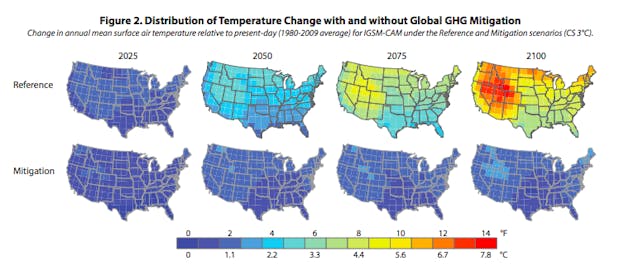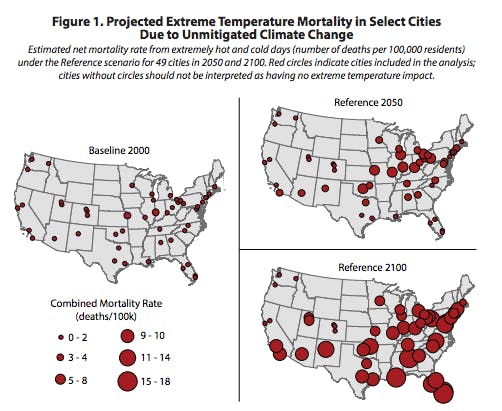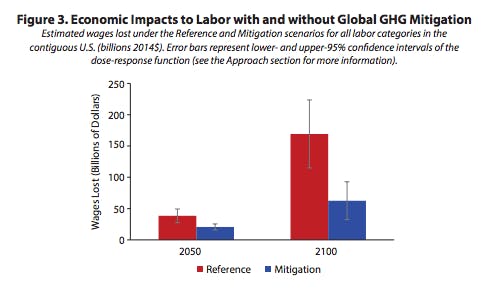To mark the two-year anniversary of President Barack Obama’s climate change agenda, the Environmental Protection Agency is out with a peer-reviewed study on Monday that says the United States would see benefits in the hundreds of billions of dollars if the world takes aggressive action on climate change.
The point of the report is no different from arguments we've heard before from the administration, which maintains that acting now will benefit the U.S. economy tremendously in the long-run. This time, however, it backs this point with a rigorous economic analysis of how inaction affects 20 economic sectors in health, electricity, water, transportation, agriculture, forests and the ecosystem by 2100.
“It is not an understatement to say there is huge costs that we’re going to bear if we don’t take action now,” EPA Administrator Gina McCarthy told reporters at a White House briefing.
There are two scenarios projected in the study—one in which countries don’t act to reduce greenhouse gas emissions, and one in which the world meets ambitious goals to curb warming by 2 degrees Celsius. Limiting global warming to 2 degrees Celsius would prevent 12,000 deaths annually in 49 cities, save 7.9 million acres from wildfires, and reduce droughts by 59 percent. There would be fewer bridges to repair, a more robust fishing industry, a more productive workforce, and more efficient agriculture industry. Several figures from the report contrast the two possible futures:



This isn't the first time the White House has framed climate action as a savvy investment that reaps economic benefits decades down the road, nor will it be the last. “What is hopeful about this report is that it once again shows not just that these actions are real and we need to act now, but there are real dividends, there are real economic dividends to acting early and acting aggressively particularly for our economy,” Brian Deese, the top White House adviser on climate change, said.
However, the report may be too hopeful. It outlines an ideal scenario for the U.S., where global warming stops at 2 degrees Celsius, that we are unlikely to meet even if countries reach a global deal at the end of the year. As part of the United Nations Climate Change Conference in December, each country has to submit pledges for cutting emissions after 2020. The contributions so far by the world’s largest polluters, including the U.S., don’t put us on track to meet that goal. Critics charge that Obama has done too little on important sources of domestic pollution, like methane from agriculture and natural gas and coal in the power sector. Meanwhile, Republicans in Congress have done everything they can to hold the U.S. back from doing more.
Despite this, Deese noted, “you’re continuing to see a clear commitment to taking the kind of long-term actions that will be necessary to get to the place where science tells us we need to get.”
The political decisions Obama, his successor, and other world leaders make in the next few years will determine the future of the U.S.'s economy for the next century. “Those decisions are not going to wait for 50 years," McCarthy said. "They’re today’s decisions and we have to get moving."
